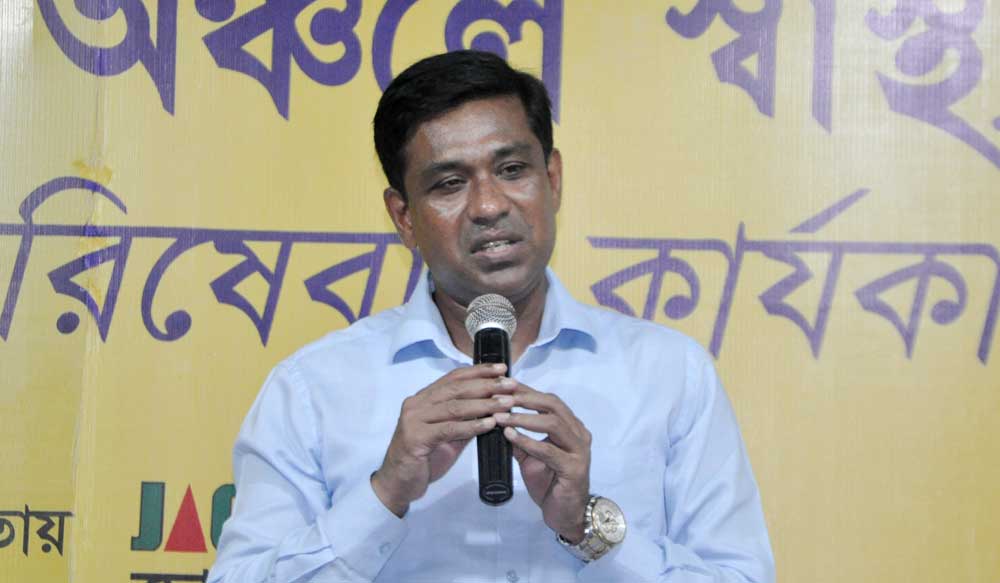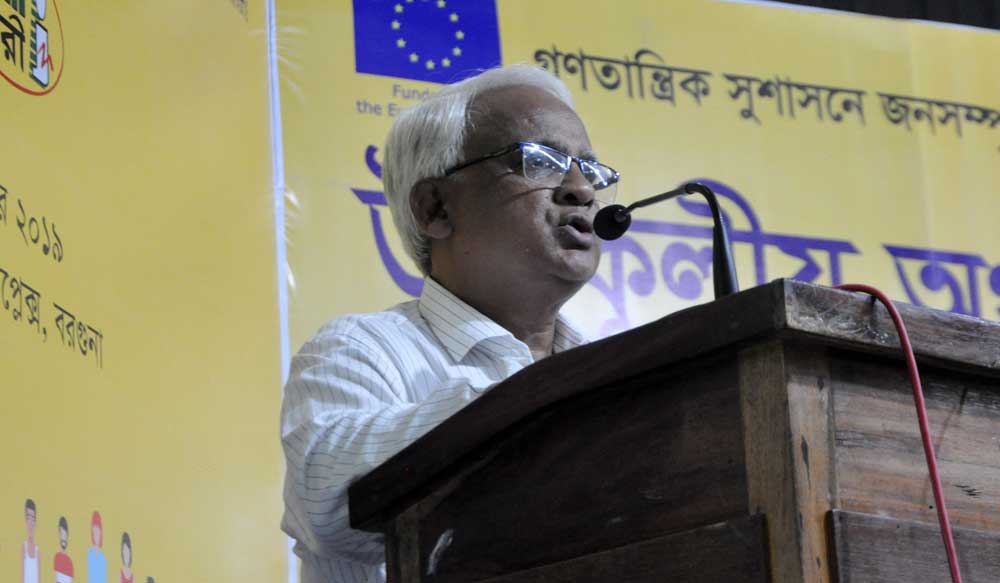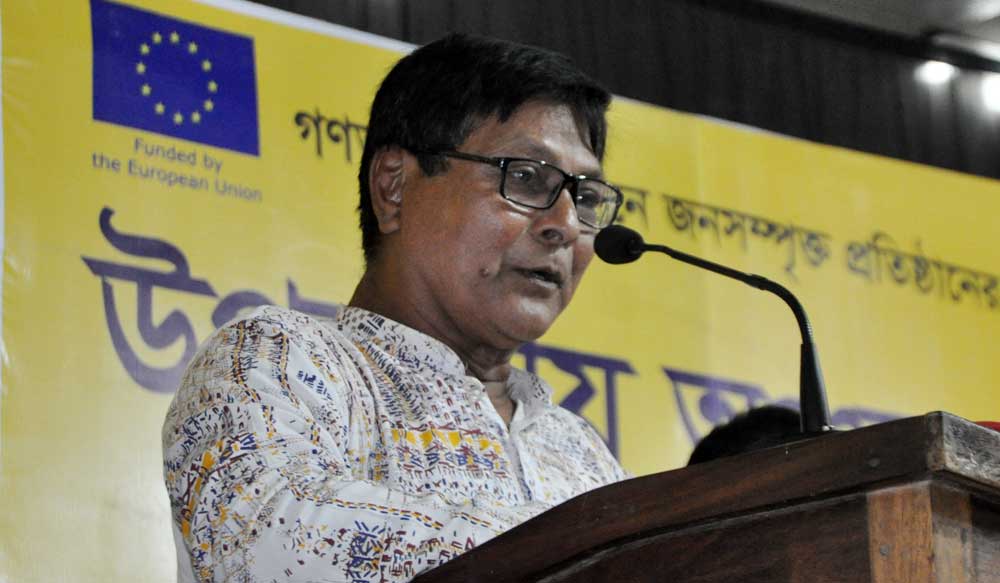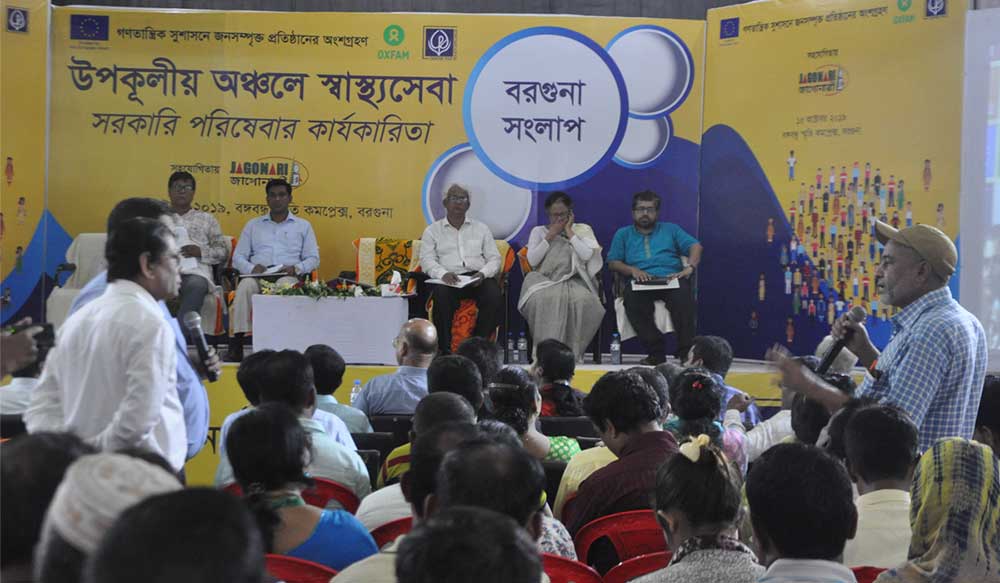
There is a shortage of adequate and skilled human resources at the community clinics and health centers in the coastal region of Bangladesh. People of these hard-to-reach and disaster-prone areas are being deprived of necessary health services due to lack of human resource in public services. To ensure effective health care services within the existing manpower, government surveillance will have to be strengthened. Enhanced coordination and communication between government and non-government organizations is essential to increase accountability and proper monitoring in ensuring effective healthcare service delivery. The inability to provide adequate healthcare to the people living in the coastal areas, would undermine the realisation of the Sustainable Development Goals (SDGs) from the apprehension of “Leave No One Behind”.


These observations emerged from a dialogue in Barguna titled “Healthcare in the Coastal Areas: The Effectiveness of Public Service Delivery” on Tuesday 15 October 2019. This event was organised jointly by Centre for Policy Dialogue (CPD) and Oxfam in Bangladesh, in association with Jago Nari, under an ongoing project titled ‘Enhancing the participation of community-based organizations (CBOs) and civil society organization (CSOs) in democratic governance in Bangladesh’, supported by the European Union.

Mr Towfiqul Islam Khan, Senior Research Fellow, CPD, made a keynote presentation at the dialogue. In his presentation, Mr Khan presented a comparative status of Barguna in terms of healthcare services. He highlighted that the number of appointed government physicians is inadequate compared to the number of population in Barguna. Since Barguna is a coastal district, most of the assigned government physicians are also not willing to stay here. About 15.3% of the women in Barguna conceive before the age of 18 and, infant mortality is about 27 per 1,000 live births. The irregular presence and inadequate number of Family Welfare Assistants often hinder the service receivers from taking birth control measures in systematic ways. Service seekers often get abused by the staffs at the community clinics. Besides, there is a lack of public awareness regarding technological initiatives related to healthcare (such as Hotline 16263).

Mr Mustain Billah, Deputy Commissioner of Barguna District, as the Chief Guest at the dialogue, said that, the government is committed to implement the SDGs and the district administration is working accordingly to realise the vision. The district administration has taken various initiatives to raise awareness about sexual and reproductive healthcare among adolescents. In particular, the district administration has taken the initiative of distributing free sanitary napkins among adolescents in every school in the district. In addition, considering the differences and extent of local problems in the coastal areas, the administration had requested to the government to increase the budgetary allocation for the education and health sectors of this district.

Dr Md. Humayun Shaheen Khan, Civil Surgeon of Barguna spoke as the Special Guest at the event. He said that, in order to address the shortage of manpower in various community clinics and health centers in the district, it is crucial to increase the government workforce and budget. Besides, the District Civil Surgeon’s Office will also take necessary measures in improving the monitoring at the Upazila and Union levels.

Eminent citizen of Barguna Mr Sukhranjan Sheel, as the Discussant, mentioned that the citizens also need to be more vigilant and aware in addressing health challenges. To this end, it is important to increase publicity for all government services and hotlines to improve public awareness.

Professor Mustafizur Rahman, Distinguished Fellow, CPD, chaired the event. He said that, we can notice from the research that various health hazards of coastal areas are linked to lack of safe and potable water. The local administration and the citizens should work together to make safe water more accessible. Many people of Barguna earn their livelihoods through fishing and related activities. Separate measures can also be taken to ensure their healthcare. In the backdrop of aforesaid challenges, while it is important to have an increased budgetary allocation, enhanced monitoring and accountability towards ensuring a proper and effective use of the existing budgets is also a must at the same time. In this case, government institutions, local non-governmental organizations and citizens will need to work together to ensure effective healthcare for the people in coastal region of the country.

Ms Hosne Ara Hasi, Chief Executive, Jago Nari, delivered welcome remarks and Dr Khalid Hossain, Programme Manager, Oxfam in Bangladesh, delivered introductory remarks at the event. The dialogue was attended by around one hundred and seventy participants including public representatives, business leaders, government officials, representatives from civil society organisations, academics, researchers, students and media among others.



